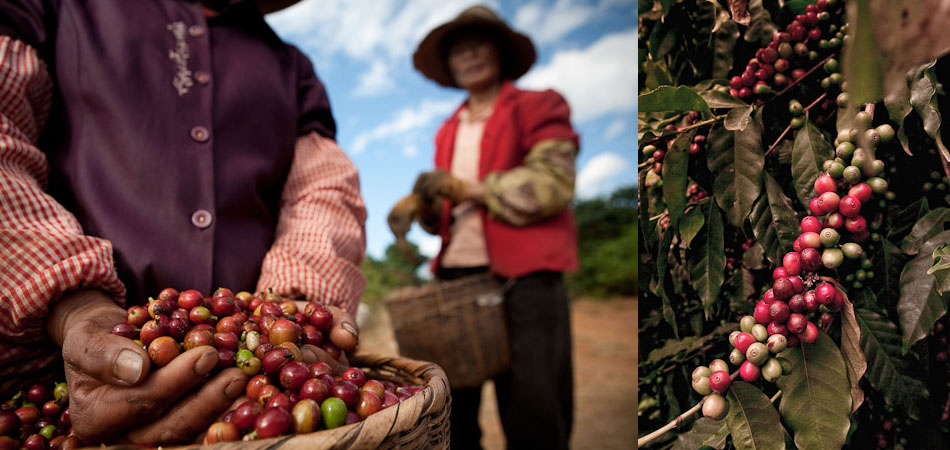Coffee production in China
The vast majority of coffee in China comes from southwestern Yunnan Province and is limited to Arabica, a cross between Arabica and Robusta, called Katim. In Yunnan, the Pu'er region produces about half of the province's coffee beans-39000 tons out of a total of 82000 tons between 2012 and 2013.
Traditionally, Pu'er only produces Pu'er tea, one of the most famous black teas that remain. Recently, however, many local farmers have begun to switch to coffee in exchange for more income.
The Development Plan of Yunnan Coffee Industry (2010-2020) outlines the challenges facing Yunnan coffee production. It can be summarized as follows: first, lack of government support and overall planning management; second, backward infrastructure restricts the increase of output; third, small batch, scattered and backward primary processing links reduce the market competitiveness of the final product; fourth, lack of market risk awareness and effective preventive measures; mainly water washing processing, but the region is facing the problem of shortage of water resources.
Mr. Wu Jiahang of FNC is also concerned about the challenges of Chinese coffee, he believes: first, the quality of coffee produced varies greatly; second, the technology lags behind due to the lack of professional technology and information exchange platform; third, there is a lack of uniform standards and long-term goals in the development and promotion of the regional coffee market; fourth, there is a lack of standard system to monitor industry data and ensure quality.
The Laojiang Manor in Pu'er, Yunnan Province, produces about 500 tons of coffee a year, a figure that will not increase significantly over the next five years to ensure that quality is higher than output. The company provides training, sales and equipment support to the 3000 coffee farmers employed throughout the process, from planting, harvesting, preliminary processing to worldwide sales.
At present, the price of most Yunnan coffee is too expensive for domestic ordinary coffee consumption, but the quality has not reached the level of boutique coffee. As a result, it is estimated that 70% of Yunnan coffee will have to be exported to cope with global price and quality competition.
As the region continues to gain important experience and awareness in the future, Yunnan coffee should be able to give full play to its potential to produce high-quality and price-competitive coffee.

Important Notice :
前街咖啡 FrontStreet Coffee has moved to new addredd:
FrontStreet Coffee Address: 315,Donghua East Road,GuangZhou
Tel:020 38364473
- Prev

Italy's economic downturn has pushed up the price of coffee
Starting in December, coffee shops in Genoa, Italy will raise prices, when the price of a cup of coffee will rise to 1.2 euros.
- Next

Nestle Coffee push capsule Coffee Machine
Nestle Coffee launched a personalized capsule coffee machine-Nestl é Coffee Dolce Gusto in Chinese mainland market for the first time.
Related
- Is Dirty the cold version of Australian White? What is the difference between dirty coffee/decent coffee and Australian white espresso?
- Relationship between brewing time and coffee extraction parameters How to make the brewing time fall to 2 minutes?
- Got entangled?! Lucky opens a new store, Mixue Ice City, and pursues it as a neighbor!
- How long is the shelf life of high-quality hand-brewed hanging ear coffee? Why is the taste period of hanging ear coffee ground into powder only one month?
- Why does hand-brewed espresso smell good but taste bitter? Is the flavor of high-quality hand-brewed coffee aroma or taste?
- Special treatment? COSTA's China business was evaluated separately!
- Match with Xi Tea?! Lucky will launch the new "Snow Cheese Grapes"
- What is the recommended proportion of water temperature and grinding time for hand-flushing Huakui coffee beans? What parameters should be used for cold extraction and cold brewing hand-brewed Huakui coffee?
- Share the most detailed golden formula for cold extract coffee making on the whole network! What proportion of ground is used to make cold coffee brewed for several hours?
- What are the advantages of segmented water injection for hand-brewed coffee? How many stages should I fill the water when making coffee and what is the best time for grinding the water temperature?

